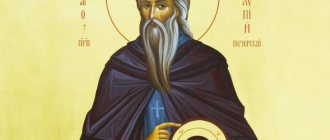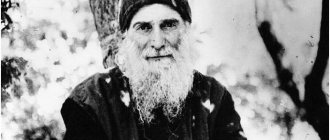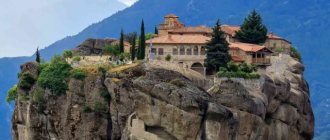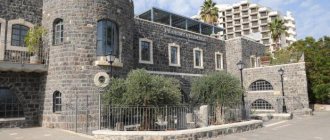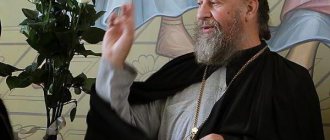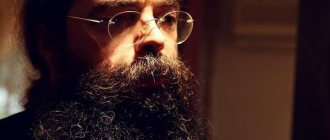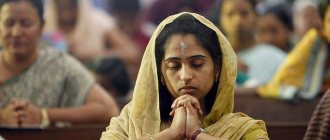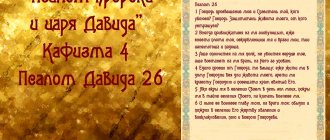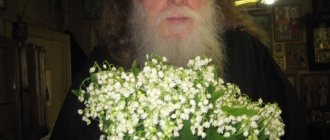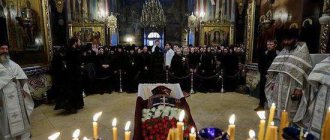| Archim. Alypiy (Voronov) |
Alipy (Voronov)
(1914 - 1975), archimandrite, abbot of the Pskov-Pechersky Monastery. In the world, Ivan Mikhailovich Voronov was born on July 28, 1914 in the village of Tarchikha (Torchikha), Lobanovskaya volost, Bronnitsy district, Moscow province, into a family of poor peasants Mikhail Yastrebov and Alexandra Voronova.
In 1926 he graduated from a rural school and moved to Moscow, where his father and older brother lived.
In 1930, he graduated from a nine-year school in Moscow and received a certificate of complete secondary education.
In 1930-1932 he lived in Tarchikha with his mother and worked on a collective farm.
In 1932-1936 he studied at the evening studio at the Moscow Union of Artists in the former workshop of Surikov.
In 1932-1935 he worked as a tunneler on the construction of the first stage of the metro.
In 1934 he moved to an apartment at the address: Moscow, st. Malaya Maryinskaya, 18, apt. 4.
In January 1935 he worked as a miner at mine No. 12 (Sverdlov Square).
On July 10 of the same year he became a member of the amateur art sector of the Moscow Union of Soviet Artists.
In 1935-1936 he worked in the operation of the metro: cashier, controller, assistant station attendant.
From February 15, 1936 to May 15, 1941 he studied at the Art Studio of the All-Russian Central Council of Trade Unions in the department of painting and drawing.
From October 15, 1936 to November 13, 1938, he served in the Red Army.
From November 13, 1938 to February 21, 1942 he worked at the military plant No. 58 named after. Voroshilova: transport department dispatcher.
From February 21, 1942 to September 25, 1945, he was drafted into the army: 601 Red Banner Rifle (02/21/1942-04/1/1942); 5th Guards Red Banner SME (04/1/1942-07/1/1943); 16th Guards Red Banner MB (07/1/1943-07/17/1945); 7th separate guards, Lvov, orders of Suvorov, Kutuzov, Bogdan Khmelnitsky, Alexander Nevsky regiment (07/17/1945-09/25/1945).
In 1943, the works of I.M. Voronov were exhibited at the Mozhaisk Museum of Local Lore: the paintings “Transfer of the Mozhaisk Banner to the Sponsored Unit”, “Shalikovo after the Occupiers”, the photo-art album “Gift to the Chefs”. The composition “Presentation of the Guards Banner” was kept in the NKVD club (Moscow).
On September 25, 1945, he was demobilized from the Red Army.
In 1946-1950 he worked at the USSR Exhibition Fund as an artist working under one-time labor contracts with government agencies in Moscow.
On June 5, 1947 he joined the Moscow Association of Artists.
On March 12, 1950, he entered the Trinity-Sergius Lavra (Zagorsk) as a novice.
In 1950-1959, while in the Trinity-Sergius Lavra, he carried out obediences on the restoration of paintings of the Trinity, Assumption Cathedrals, the Refectory and the Academic Church, supervised the work of icon painters, and took part in the restoration of churches in Moscow and the Moscow region.
From March 1950 to October 1951, he served as a painter and candle maker.
On August 28, 1950, he was tonsured a monk by the Lavra’s governor, Archimandrite John (Razumov), and named in honor of the Monk Alypius, the icon painter of Pechersk.
On September 25 of the same year he was ordained a hierodeacon by Patriarch Alexy I of Moscow and All Rus', and on October 14 he was ordained a hieromonk. Appointed sacristan of the Lavra.
From October 1951 to October 1953 he served as an artist-restorer and sacristan.
On October 15, 1952, he was registered by the Commissioner of the Council for Religious Affairs for the Moscow Region as a clergyman among the brethren of the Lavra.
In April 1953 he was elevated to the rank of abbot.
From October 28 to December 1, 1953, he served as an artist for the restoration of the Patriarchal Metochion in Lukino, restored the mansion of St. Philippa.
On January 15, 1955, he was appointed a member of the Art Commission for the restoration of the temple of the Moscow Theological Academy, and worked as an artist.
From March 1955 to January 1956 he worked as an artist for the restoration of the Church of All Saints in the Lavra.
In April 1957, he led the group to transfer the relics of Metropolitan Macarius of Moscow from the Kotelnichesky cemetery to the Lavra.
On July 28, 1959, he was appointed abbot of the Pskov-Pechersky Monastery.
On August 11 of the same year, he took over the farm and property of the Pskov-Pechersky Monastery from Abbot Augustine.
On September 3, 1959, he was released from the post of governor of the Pskov-Pechersky Monastery with his return to the brotherhood of the Trinity-Sergius Lavra. On September 28, he handed over the farm and property of the Pskov-Pechersky Monastery to the Spiritual Council of Elders.
On October 6 of the same year, he was confirmed as the abbot of the Pskov-Pechersky Monastery.
In 1959-1975, as governor of the Pskov-Pechersky Monastery, he did a lot to restore the remarkable monuments of ancient Russian architecture to their original form, took care of the safety of ancient frescoes and icons, the beauty of the liturgical rite, achieved the return of the richest treasures of the sacristy to the monastery, and put a lot of effort into protecting monastery from closure.
On February 11, 1960, he was elevated to the rank of archimandrite.
Between 1960 and 1961 he carried out an artistic examination of the restoration work carried out in the Kazan Church in the city of Velikie Luki (Pskov region).
On March 14, 1973, he donated two paintings by N. Roerich from his collection to the Pechora Museum of Local Lore.
On March 25 of the same year, he signed an Act on the return to the monastery of the sacristy items taken from Pechory on March 18, 1944 to Germany.
| Archim. Alypiy (Voronov). 1974 |
In 1974, he donated part of his collection to the Russian Museum - about 70 paintings by Russian artists.
The rest of the collection, according to his will, was transferred to the Pskov Museum-Reserve after his death. At the beginning of 1975, Father Alypiy had a third heart attack. He had mortal memory in advance. A coffin was made for him in advance with his blessing and stood in his corridor. And when they asked him: “Where is your cell?” - He pointed to the coffin and said: “Here is my cell.” In the last days of his life, Hieromonk Father Theodorit was with him; he gave Holy Communion to Father Alypius every day and, as a paramedic, provided him with medical care. On March 12, 1975, at 2 o’clock in the morning, Father Alypiy said: “The Mother of God has come, how beautiful She is, let’s paint, let’s paint.” The paints were applied, but his hands could no longer operate, how many heavy shells he dragged with these hands to the front line in the Great Patriotic War.
He died at 4 a.m. on March 12, 1975. On March 15, he was buried in the monastery cave cemetery behind the throne of the Cave Church of the Resurrection of Christ.
In May of the same year, the Russian Museum of Leningrad hosted the exhibition “Russian Painting and Graphics of the 18th-20th Centuries from the Collection of I.M. Voronov”, and a catalog of the exhibition was published with an introductory article by Savva Yamshchikov.
Truly a man of strength and reason, an integral, selfless person, was Archimandrite Alypius in all manifestations of his Christian service. A clear assessment of his character are his own words: “The one who goes on the offensive wins. It’s not enough to defend, we need to go on the offensive.”
Father Alypius often preached, especially about Christian love, saying: “Christ, who suffered on the Cross, commanded us: “Love one another!” And therefore, in order to get rid of evil, you need only one thing: to fulfill this last commandment of the Lord.”
Father Alypiy always helped those in need, gave out alms, and many who asked received help from him. For this, Father Alypius had to endure a lot. He defended himself with the words of Holy Scripture about the need to provide works of mercy and argued that works of mercy cannot be prohibited; they are an integral part of the life of the Holy Orthodox Church. Whoever prohibits works of mercy infringes on the Church of Christ, does not allow her to live the life inherent in her.
As an icon painter and restorer, he took care to restore the bronzed dark iconostasis of the Assumption Church, the interior painting of St. Michael's Cathedral, St. Nicholas Church (he restored the tyablo iconostasis, restored the icon of the Saint, expanded the temple with a tower, strengthened the walls, restored the stylish dome (stylish - from the word “style” - a set of features characteristic of art of a certain time and direction (in this case, the Pskov school of architecture of the 15th-16th centuries).
The fortress wall with battle towers and passages was restored, and their coverings were restored. The six icons of the Mother of God in the St. Nicholas Chapel were painted with his participation and guidance.
Father Alypiy was distinguished by his special determination and fortitude. When he burned the paper about the closure of the Pskov-Pechersky Monastery in front of the envoys, he turned to them and said: “It would be better for me to accept martyrdom, but I will not close the monastery.” When they came to take away the keys to the caves, he commanded his cell attendant: “Father Cornelius, give me an ax here, we’ll chop off heads!” Those who came fled.
The famous restorer Savva Yamshchikov says:
“Father Alypiy and I are standing on the balcony, talking about icons.
A car pulls up: “We’re from the financial inspectorate, carrying out an inspection.” The abbot clarifies: “Who sent you?”
- Like who? Regional Executive Committee
— The fact is that I do not obey the regional executive committee. Only to the Metropolitan.
- Okay, we'll call.
- No, you can’t attach a call to business. Bring me the paper. It’s not far here, about fifty kilometers there, and the same amount back. It's still early, you'll have time.
The financial inspectors left. After a while the Metropolitan calls:
- Alipy, why won’t you let me in?
- I can’t do it without your permission.
- Well, let me go, I order you.
- Vladyka, a telephone conversation cannot be added to the case. Please give me a telegram, a telegram. Your secretary will answer, and in three minutes she will be here. My postman walks quickly.
Indeed, half an hour later the secretary brings a telegram. Then the financial inspectorate arrived and quickly turned around. Archimandrite Alipy comes to them with a telegram.
- Oh, we've arrived. So how is it?
- Well, of course! Here you have a telegram.
“I’m now sending my contact in our car to the first secretary of the regional committee, Ivan Stepanovich Gustov. What are you doing? You represent the regional executive committee, and you have a document from the one you are fighting with, from the ruler. You are atheists! How can I let you check the monastery using such a document? Go ahead, and I’ll call Ivan Stepanovich.
When the inspectors left with nothing, I asked if Ivan Stepanovich was really going to call. Shrugged. Why bother? They won't come again anyway...
And so every day. One day he told me: “Savva, if they later paint my hagiographic icon, then it should consist of 25 marks. By the number of lawsuits that I won against the Soviet authorities. Now they drag me for one thing, then for another. But I brilliantly won all the cases.”
[1].
Father Alypiy more than once wrote criticism of lies about the Pskov-Pechersk Monastery and wrote an article about the Monk Cornelius in the Journal of the Moscow Patriarchate [2] so that history would not be distorted.
He defended believers before the powers that be and took care of getting them jobs. He wrote that the whole guilt of these people lies only in the fact that they believe in God. He was friendly and sociable, received visitors with love, shared his talents, and gave wise answers.
When civilian visitors asked him how the monks lived, he drew their attention to the divine service that took place in the Assumption Church. “Do you hear that?” - he asked. The visitors replied: “We hear.” - “What do you hear?” - “The monks are singing.” - “Well, if the monks lived poorly, they would not have started singing.”
When the believers were cutting up flower beds in the monastery, the authorities asked: “Who works for you and on what basis?” Father Alypius replied: “It is the master people who work on their own land.” And there were no more questions.
He instructed the pastors of the church arriving at the monastery to be diligent in serving in his church. “Here, you, father, have left your temple, and the demon will serve in your temple.” - “How so?” - they objected to him. Father Alypiy answered in the Gospel: “The demon will find an empty temple...”
During the foot-and-mouth disease epidemic, he explained that services in temples should not stop, since cows do not go to temples, and not a single institution stops its work on the occasion of foot-and-mouth disease.
When they were not allowed to visit the caves, Father Alypiy blessed every morning, at 7 o’clock, to serve a memorial service in the caves, so that believers would have the opportunity to visit the caves and remember their relatives and friends, especially those who died in the Great Patriotic War. A decree was sent that funeral services should not be held in the caves. The funeral services continued to serve with the blessing of Father Alypius. When Father Alypy asked whether he had received the decree, Father Alypy answered that he had received it. “Why don’t you do it?” - followed the question. Father Alypiy replied that this decree was written under pressure due to weakness of spirit, “I don’t listen to the weak in spirit, I listen only to the strong in spirit.” And the service of memorial services in the caves was not interrupted.
Father Alipy never went on vacation. And even, as he himself wrote, he did not leave the monastery gates of his own free will, but was diligently diligent in fulfilling his monastic vows. And he answered the accusers that if worldly evil spirits flow from the world into the monastery into the clean monastery courtyard, then it is not our fault.
Until his death, he taught a blessing for every monastic service and activity and did not abandon his obedience.
Awards
Church
- pectoral cross (25 October 1951)
- pectoral cross with decorations (October 8, 1953)
- Patriarchal charter (February 21, 1954, for work in Lukino)
- gratitude (February 11, 1955, for a valuable gift to the church-archaeological office - an icon of St. Nicholas from the late 16th century).
- Patriarchal charter (March 23, 1963)
- Order of Christ the Savior and Cross, II degree (July 11, 1963, awarded by Patriarch Theodosius of Antioch)
- Order of St. Prince Vladimir, III degree (November 26, 1963)
- the right to serve the Liturgy with the Royal Doors open until the communion verse (1966).
- Order of St. Prince Vladimir, II degree (August 27, 1973)
- pectoral cross with decorations (9 September 1973)
Secular
- awarded for good performance in the amount of 100 rubles (November 4, 1940, plant 58).
- Medal "For Military Merit" (October 15, 1944)
- badge "Guard" (April 15, 1945)
- Order of the Red Star (8 July 1945)
- medal "For victory over Germany in the Great Patriotic War" (July 10, 1946)
- Medal "For the Capture of Berlin" (January 8, 1947)
- Medal "For the Liberation of Prague" (February 10, 1947)
- medal "In memory of the 850th anniversary of Moscow" (September 17, 1948)
- anniversary medal “20 years of victory in the Great Patriotic War” (December 1, 1966)
- anniversary medal “50 years of the Armed Forces of the USSR” (November 28, 1969)
- anniversary medal “25 years of victory in the Great Patriotic War” (1970)
- memorial sign “People's Militia of Leningrad” (November 30, 1971)
- badge "Veteran of the 4th Guards Tank Army" (1972)
If it weren’t for Father Alypiy, there would be neither our monastery nor the eldership
Source: Pravoslavie.ru
On this day, Archimandrite Alipiy (Voronov) - the Great Viceroy - was born and 45 years later on the same day became the abbot of the Holy Dormition Pskovo-Pechersky Monastery. He has many such coincidence dates in his life: for example, the day when he decides to leave the world and enter a monastery, 25 years later will become the day of his call by the Lord to the eternal abodes.
Archimandrite Alypius is remembered by the governor and guests of the Pskov-Pechersky Monastery.
Archimandrite Alipy (Voronov)
The only one who was able to resist this terrible pressure from the godless authorities
Metropolitan Tikhon of Pskov and Porkhov:
– People came to our monastery especially, possessing a priceless treasure of memory of a man, without whom our monastery would not exist now – we are all well aware of this. This man is Archimandrite Alipy (Voronov). Last year we celebrated the 60th anniversary of the start of his abbess; it lasted just over 15 and a half years. But what were these years and what did they mean for the monastery and the Russian Orthodox Church?
In the late 1950s and early 1960s, there was a wholesale liquidation of monasteries and churches across the country.
In the late 1950s and early 1960s, there was a wholesale liquidation of monasteries and churches throughout the country. The bishops and governors themselves signed these decisions to close the shrines - such was the force of pressure on them. I remember the life story of Archbishop Luke (Voino-Yasenetsky). He spent 11 years in the camps. A man of principle! And he was forced to sign decrees on the closure of churches in Crimea...
But Father Alypiy withstood all this onslaught! He was probably the only one of the bishops and priests of the Russian Orthodox Church of those years who was able to withstand this terrible pressure from the godless authorities.
If he had signed this decree in 1961, our monastery would not have existed. I would have signed it, like everyone else... They would have immediately set up warehouses and production bases in the monastery. It would be very convenient to place an auto repair shop in St. Michael's Cathedral, as was the case in many churches of this size. Caves are a great place for vegetable storage. All these relics, remains - “how unhygienic it all is!” They should have been taken out of there. They would issue an order for the removal and subsequent sanitization of the caves, after the sanitary treatment of which they could already be used for “normal agricultural” or some other proper Soviet purposes.
Metropolitan Tikhon of Pskov and Porkhov
There would be no old age. Neither Father John (Krestyankin), nor Father Seraphim (Rosenberg), nor Father Adrian (Kirsanov), nor many others. The monastery would have been abolished, and all of us would not be here now.
Father Alypiy restored the monastery when it, like the entire Russian Orthodox Church at that time, did not even have the status of a legal entity. How was it even possible to purchase everything for a comprehensive restoration, when in principle nothing was sold to a private individual in such volumes? Moreover, Father Alypius himself did not even have registration, the only and exclusively presence of which a priest under Soviet rule had the right to serve. And he served! Restored the monastery. He gathered the brethren, despite all restrictions. Preached. Talked to people...
Out of gratitude to this great, without any exaggeration, man, we all gathered in this monastery he saved to honor his memory, first of all, with prayer. And we get this precious opportunity - to hear first-hand (and for the readers of Pravoslavie.Ru to read for the first time) these memories of the Great Viceroy.
“He will never see death” (John 8:51): a strange incident and prediction in war
Metropolitan Lev of Novgorod and Old Russia:
– The first time I came to the monastery was in 1961. I was 15 years old. Father is a priest. The intensity of the anti-religious campaign was then such that he was simply made disabled - my dad had a stroke, and the doctor was forbidden to come to him. So he lay at home, in such a helpless state...
One of his parishioners (later she took monastic vows with the name Maria) immediately turned to my mother:
- Mother, it would be nice if Kolya (my name before tonsure) went to Pechory. I prayed. Come on, the priest would feel better.
This parishioner herself often visited the Pskov-Pechersky Monastery. And it was the first time I came here with her. Stopped somewhere in the city. Nobody knew that I was the son of a priest; they tried not to advertise this then.
The next morning we came to the monastery. Pray and venerate the shrines. They went to the city again. Suddenly Mother Maria suddenly comes to her senses:
- Let's go back to the monastery!
Metropolitan Lev of Novgorod and Staraya Russia
I don’t know what happened (she never told me, and I didn’t dare ask), but as soon as we quickly walked down the Bloody Path, we saw Archimandrite Alypius at the well... He knew her.
- Who is this? - nods at me. And he was sometimes harsh.
“This is the father’s son,” he answers, “They have grief in the family...” and she told him.
“He has nothing to do here in the city,” he orders, “we’ll put him in a monastery.”
So, having arrived for one day, I stayed for the whole summer. And then I spent all my holidays here. There were still Valaam elders here at that time - Hieroschemamonk Mikhail (Pitkevich), but he was in seclusion; Schemamonk Nikolai (Monakhov), he, too, was already bedridden and blind; schema-abbot Luka (Zemskov); Schema-abbot Savva (Ostapenko) was already in the monastery at that time.
All day long, pilgrims crowded around the gate of the small house where the Valaam elders lived, in order to somehow see them and communicate. Father Luka (I found him) was still leaving.
As soon as Father Savva or one of the other fathers appeared in a hood and robe, they immediately came from all sides: “Father, bless!”, “Bless!”, “Oh, bless, father!”
Having been placed in a monastery, I was soon assigned to obedience. They were different. For the most part, on the side of father Iriney (Ponomarev): to the barnyard, harvesting hay, working in the garden, herding cows, helping in the kitchen, making prosphora, etc.
I did not see Father Alypius on weekdays. And he served at the all-night vigil on Sunday and at the Sunday liturgy itself. These are unforgettable services.
And then I was walking on the Holy Hill. I look at her, people are so cheerful, they make their way in single file after each other, deliberately maintaining a distance so that they come out one by one, just strolling... “What is it,” I think, “are they?” I approached, and they gathered in such a small group and were clearly waiting for something...
And then Father Alypiy appears!
He came here later to pray. The people found out and began to take advantage of it. At that time, it was impossible to really preach any kind of sermon. As soon as you started saying something intelligible and to the point, all this was immediately stopped. So people looked for ways to communicate with the clergy.
They asked practically no questions to Father Alypius; he answered everything himself. “I’ve been thinking about this for a long time...” was all I could hear later, when, amazed and saturated with his speech, everyone dispersed. Perhaps he himself did not know how he did it. Why do his words so cleverly untie the knots of someone’s perplexities and contradictions? This despite the fact that these were the most simple conversations about this and that. Sometimes in a narrower circle he told stories from his military life.
I specifically checked what had already been published, and I couldn’t find these episodes that I heard from him anywhere.
Perhaps he himself did not know why his words untie the knots of someone’s bewilderments and contradictions
They walked with a friend along the fields-roads of war, and before they missed each other, they agreed: if anything happened to anyone, they would inform the other.
Before his tonsure, Alypius's father's name was Ivan. He climbs into the tent late in the evening (the fighters spent the winter in tents). Fell from fatigue at the tension wall. Suddenly a voice...
- I died.
Four days later, the news of a friend’s death arrived by mail...
Or somehow their regiment was stationed. And Ivan was given rather strict rules as a hostess; it somehow went without saying: no get-togethers with your co-workers. And then take it and offer it to him:
- If you want, call the guys. I'll bake you some pies.
They sat, but how to leave, this woman suddenly asks them:
– Do you want me to tell you all what awaits whom?
“Come on,” they agree, tired after the feast.
“You will die on the lap of your beloved,” she told one. “You’ll shoot yourself,” to another. “You will survive the war...” - she told the future father Alypiy - and fell silent...
- What about Ivan?
It’s somehow strange: she brought them all to the end, told them about death, but to him?..
She looked and looked like this:
– And the Unbrided Bride is waiting for you.
Then one was wounded in the head. A doctor was found who looked after him very carefully, and he died on her lap.
The second, being surrounded, shot himself. He was able to somehow hand over the documents so that they would not fall into the hands of the Germans, and that’s how news of his death became known.
He preserved this source of “living water” (John 4:10), raising mortals to eternal life
The war has been won. The Trinity-Sergius Lavra opened. Ivan Voronov began working there as a restorer.
“A lot of time has passed,” he told us, “I have already forgotten about that incident.” Ripe for monasticism. And when the words of the kontakion sang: “Rejoice, Unbrided Bride...” - I remembered! That's what they told me about!
Father Alipius is a man who walked the path from unbelief to God and reached this great monastery, where he performed his epoch-making service. He preserved this source of “living water” (John 4:10), which raises mortals to eternal life.
If the governor said, everyone tried to fulfill
Metropolitan John of Yoshkar-Ola and Mari:
– Having once visited the Pskov-Pechersk monastery and tasted the sweetness that resides here, you already feel with all your heart and soul: you will not be able to live further without this monastery.
Archimandrite Alypius, in this world of discord and fragile ties, gathered the brethren who became a single family here on earth, and, as the holy fathers teach, in eternity. How the love that was shown here by the elders, among the brethren and between the governor and those whom the Lord vouchsafed to come here, has always amazed us!
Now, looking at the brethren, visiting the monastery, I, unfortunately, from year to year notice how the brotherly love that so attracted pilgrims and simply those who, perhaps, were still looking for Christ, is being lost. And I found Him, having been here at least once for monastic tonsure! Archimandrite Alypius performed it in the Assumption Cathedral. When he, Father Damascene (Sakhnyuk), and Hierodeacon Sergius (Shalovsky) sang “The Father’s Embrace,” the whole people cried. After his tonsure, Father Alypius always addressed his words to the brethren. I remember after the tonsure of one schema-monk he said:
Metropolitan John of Yoshkar-Ola and Mari
- Dear brother! You died for the world and were born for eternity. You have approached the Most Pure One, and be Her faithful child. By your life in obedience to Her, in the person of the abbot, show that you are the one who today has already entered the life of the future century, under Her Divine Cover.
We were still boys then, we were 8–9 years old. Many have probably heard recorded or read the sermons of Father Alypius. His style was always simple and easy, so that even we children listened and understood everything.
If the governor spoke, everyone tried to do it.
Meeting of the Lord. 1960s. In the Sretensky Church, Father Alypiy told us:
– Today each of you met Christ. You have come to the monastery, open your heart to the Infant God. Let Him Himself rule your lives. Your life does not belong to you, it belongs to the One who cares about you, who brought you out of the vanity of the sinful world. Take care of Christ in your heart! Do not drive Him out by disobedience. He is the source of Life and immortality.
Or one winter, when everyone had gathered in the refectory, Father Alypius, according to tradition, after the meal addressed the brethren (this was somewhere in the 1970s, I was already a resident of the monastery):
- Dear brothers, now we must each not only warm our souls, but also our bodies. Firewood is being delivered today, I ask you all to go out into the yard.
Now we all, without exception, are losing what unites us with Christ - brotherly love
Imagine: the monks, the hieromonks, and the novices - all gathered as one. Some people chop wood, others pass it on, others stack it. The elders, who are weaker, take at least one log each and carry it to their cells. (Back then there was a stove in every cell).
But how could all this unite everyone! How then did the brothers communicate with each other! We, young people, want to know and understand everything, but they are like children! The old people communicated in such a way that from the outside it looked like they were in kindergarten!
Only now do we realize WHAT they had. Love for Christ - and showed it in communication with each other.
Now we all, without exception, are losing what unites us with Christ - brotherly love. I would like to wish for everyone, and above all for myself, that what our elders, led by Archimandrite Alypius, collected bit by bit and put into you and me, teaching, instructing, leaving us in their words, which can still be heard in recordings or read in the books published by the monastery - so that all this will bring at least small fruits of love in our lives.
Let us learn from him courage, humor, openness and love
Archpriest Nikolai Sokolov, rector of the Church of St. Nicholas in Tolmachi at the Tretyakov Gallery:
– I first came to the Pskov-Pechersky Monastery when Father John (Krestyankin) had already settled here. My father, Archpriest Vladimir, at one time served with my father in Grebnevo, near Moscow. When mom and dad found out that Father John was here, their hearts lit up, and we got ready. By the way, from conversations at home during training camp, I realized that my father also knew Archimandrite Alypius from the war. My parents equipped our Pobeda car, took me, a teenager, and still very tiny Fedyusha with them, and so we all went to Pechory.
For the first time I saw the Great Viceroy on the very balcony where he went out to talk to the people. This all happened more than half a century ago. I myself didn’t even think that I would have to tell anything about him, otherwise I would have written everything down then, in hot pursuit.
Archpriest Nikolai Sokolov
My visits to the monastery were still more or less rare: under Father Alipia I was here 10-15 times, sometimes I lived for a month, sometimes for 2-3 days.
After communicating with Father Alypius, an image remained in my heart: this is a warrior of Christ, a fighter at the front, including missionary service, to which every Christian is called to one degree or another. He had no fear of anyone, he feared only God. And he was not so much afraid as he was already in love. Therefore, whatever he did, he did it with all his might. Whatever he said, wanting to convey to everyone, it was from the bottom of his ardent Christian heart.
By the way, he always fulfilled his spoken word.
He had no fear of anyone, he feared only God. And I was not afraid as much as I loved
I look at the modern brethren: a monk is walking through the monastery, his eyes on the ground, so as not to see anyone, in himself. “The cell is a coffin, the door slams, I’m sitting here trying to save myself, I don’t know anyone,” as one priest joked. This happens with monks. But our Christian duty is also to open ourselves to people. Isn’t that why they go to monasteries so that, by creating monastic families-communities, they glorify God so that when people see them, they themselves glorify Christ and go to the monastery?
Father Alypiy noticed everyone. You also need to be able to see a person in such a way as not to reject him, no matter what he is. I remember we were talking with Father Alypiy, standing on the balcony, and he noticed that the soldiers were coming.
- The guys have come! – he was delighted. - Well, have you come to the temple? Don't be afraid of me. I won't cut anything off for you here. Everything will be fine for you.
They are laughing. And he used this humor to remove the barrier, and then turned these light jokes into such moral teachings that it was impossible not to feel the great power of God’s grace behind them.
Today we must learn this courage, humor, openness, love - he himself had all this and instilled it in everyone who communicated with him.
There were cases when we condemned him. His environment was difficult. But behind all the attacks, Father Alipy’s sweet smile immediately appeared. He comes and puts down the skufia:
- Nothing, everything is fine.
He was an artist by nature - perhaps it was difficult for some of the monastery regulars to understand. For example, he said:
– I was at the ruins in Tallinn. I bought two antique tables there. And then I look: in the corner on a pile of rubbish there is a vase lying, so broken. Looked closer: real amber! I ask about it, but I’m so reluctant: “Yes, we wanted to saw this vase, make a lot of crafts out of it. We also have a second one, which is also not very good.” They show the second... And I understand that these are masterpieces of amber work!
Somehow he made a deal and brought these vases to the monastery. This was in 1963–1964. Today they decorate the office of Bishop Tikhon.
In general, he was a collector. But not only as an antique dealer. He knew how to reap the harvest of spiritual life. This is what we need to be able to do! Live not for yourself, but for others. Don't save yourself. The Lord Himself knows who is destined for what. I remember Father Alypiy told me:
“Now, if you wipe away even one tear in your life, the Lord will reward you for it.”
If you wipe away at least one tear in your life, the Lord will reward you for it
One day we arrived at the monastery. I was already 15–16 years old. Since Father Alypiy knew our family well, he sometimes spent an hour and a half of his time with us. We were sitting, I remember, at his table, he even poured us a glass.
“Guys,” he suddenly perks up, “stay here tonight.” I’ll put you down myself now: who’s where.
He identified me in the living room, on the sofa:
- Here, lie down here. Look where you will be - lying under Aivazovsky! Do you know what kind of artist this is? It will be with you...
At that time, of course, I had no idea that I would serve at the Tretyakov Gallery...
And he sends away his brother, then still Seraphim:
- And you go to your cell, you will sleep there.
He later became a monk Sergius, then a bishop. Already reposed - Kingdom of Heaven!
The next morning I wake up and look: a bottle of Borjomi has been prudently placed next to me and a cross lies, golden, on a chain. “Someone left it, or what?..” - I’m trying to figure it out. Suddenly Father Alypiy enters and precisely answers my thoughts:
- Kolya, this cross is for you!
- Father Alypiy, how are you? – I hold it in my outstretched palm.
- No, take it, you will come here again and remember me...
(When Father Nikolai shared his memories with the brethren of the monastery, he showed everyone this cross, which he has not parted with since then).
Most importantly, have love for each other
Archimandrite Joseph (Palchikov), confessor of the St. Demetrius Troyekurovsky Hilarionovsky Convent, Yeletsk diocese:
– I came to the Pskov-Pechersk monastery in 1966. The authorities then set a strict limit: no more than 40 brethren. Moreover, the admission of young people was prohibited. But the wise father governor, despite all the machinations of the authorities, accepted us and accepted us... I was actually 15 years old. There wasn't even a passport. He appointed me as a worker.
“I’ll think about it now,” he says.
This, they say, will be a test for you. It lasted until a year later he sent me to receive a passport. Then I already registered it for the workers. True, we young people still had to register somewhere in the city. In the monastery I was listed as a watchman. But he also performed monastic obediences: he served as a subdeacon with the superintendents Andrei (Sukhenko) and Theodore (Tekuchev), then he was an assistant with the father of the governor.
Often after meals, Father Alypius addressed moral teachings to all the brethren. Beyond all limits, there were already 100 of us... And we were all different!
“Don’t forget, the main thing,” he instructed, “have love for each other.”
Archimandrite Joseph (Palchikov)
Everyone, naturally, stumbled, especially the young ones. But he always had condescension, especially towards us young people.
I lived for two years under his chambers, next to three schema-monks, a hieromonk, a hierodeacon, and novices. Every evening he came down to us.
Father Nikolai Sokolov was just telling how the governor shrewdly arranged for them to spend the night - and so, he immediately laid me down next to some closet. “What kind of coffin is this?!” – I remember, I reacted. Only a pair of boots were kept there, which were so tight for the father governor that he eventually gave them to me.
Most of our evening conversations were about spirituality, what a monastery is, and how to live in it. We young people really needed these instructions. There was no spiritual literature in the world at that time; inside the monastery you immediately found yourself mainly doing economic obediences. Bishop John of Yoshkar-Olinsky and Mari will confirm that I got the most slaps on the head at that time at the farm yard. Although I grumbled, I endured it as best I could. During these evening gatherings of ours, Father Vicar so unobtrusively, speaking as if to everyone, was able to convince everyone: this is a test, obedience is necessary, and all that stuff.
Brethren, remember: you did not come for your own good, but for God's sake.
Brethren living here now, remember: you came not for your own good, but for the sake of God. For us, the monastery was our home. You’re walking and there’s some kind of log lying around – you need to remove it. If something is wrong somewhere, correct it. Don't be indifferent to the monastery. This is the image given to us, as far as we can perceive, of the eternal abodes - of what awaits us beyond the grave.
We weren’t looking for any honors here. We were glad to be simple novices here too. Only 2 years later, Father Alypiy tonsured me as a ryassophore. Although the dean's father Alexander (Vasiliev), the schema-archimandrite, considered me a monk, I was not a monk then, I was just a novice in the cassock.
In 1971, I was the first to be ordained as a hierodeacon, then Father David, then Father Jacob. Why were the three of us initiated at once, so young and beardless? Yes, it’s just that at that time they were establishing relations with the Japanese and American Churches, and they probably saved us in case of possible evidence that there was no persecution of the Church in the USSR...
Later I learned how much work and wisdom was required from the father governor in communicating with the Commissioner for Religious Affairs, including on our issue. Although Sergei Pavlovich Filippov worked here at that time - in general, he was a good, kind person. Not such a believer, but the governor somehow managed to establish contact with him.
It was just necessary to be patient and act with reason in order to gather the brethren and restore everything here, in this largely neglected monastery at that time.
The authorities resisted, but you know, we did our job. During my time here, the half-destroyed walls were built up, the tower at the lower gate - I carried stones there.
The authorities fought, but you know, we did our job
St. Michael's Cathedral needs to be restored, but permission is not given! Some officials from the ministry have arrived in large numbers, and there are endless disputes. Father Alypiy avoided all their speech maneuvers so brilliantly that they even opened their mouths in surprise. Each time he managed to prove that restoration, without any objections, was necessary. When they disagreed, he simply told us workers:
- Get in there and start doing it. As God willing.
And we did everything as needed, and finished everything on time.
We were especially mistreated during the reconstruction of St. Nicholas Cathedral. We are just down to business - Deputy Furtseva (in those years the Minister of Culture - Ed.) showed up. She gave us all no peace here. We held on. Only God knows how, but day after day they continued and continued their work. Everything is under the vigilant leadership of the viceroy’s father. We didn’t complain, we endured everything.
Example. Ascension, and we urgently need to go to the sawmill. It's a long way to go. The governor tells us:
- Go to the early one, and go to the late one.
Six of us gathered, and no one would have stammered: “How is it supposed to be on a holiday? Twelfth? I won’t go anywhere.” No! We just said “Bless you.”
Go. All glory to God. By evening everything was done there, and by morning the boards were unloaded in the monastery. The governor was grateful to us. And we were once again convinced that obedience is higher than holiday, fasting, and prayer.
I wish this to the modern brethren: if your father is your deputy or someone from the older brethren says something, it is better to remain silent and do it! May God grant you strength and spiritual strength to be useful to those who flock here, as was said, in search of Christ.
(To be continued.)
Prepared by Olga Orlova
